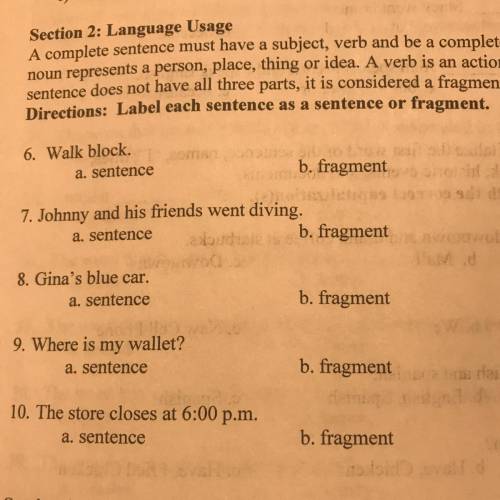
English, 06.09.2021 06:10 saabrrinnaaa
Section 2: Language Usage
A complete sentence must have a subject, verb and be a complete thought. A subject is a noun. A
noun represents a person, place, thing or idea. A verb is an action word or state of being. If the
sentence does not have all three parts, it is considered a fragment and needs to be corrected.
Directions: Label each sentence as a sentence or fragment.
6. Walk block.
a. sentence
b. fragment
7. Johnny and his friends went diving
a. sentence
b. fragment
8. Gina's blue car.
a. sentence
b. fragment
9. Where is my wallet?
a. sentence
b. fragment
det
10. The store closes at 6:00 p. m.
a. sentence
b. fragment


Answers: 2
Another question on English

English, 21.06.2019 19:30
If a text made the claim that act iv was the most important act in the entire play, what evidence could you find to prove the accuracy of that claim? list one piece of evidence from the text to support that claim.
Answers: 1

English, 21.06.2019 19:50
Construct a written analysis of approximately 300−500 words about the poem “the cremation of sam mcgee.” your analysis should explain how the figurative language and literary devices contribute either to the meaning or to the narrative structure— plot, setting, characterization, and point of view—of the poem. your analysis should contain a thesis that is discussed throughout the essay. the essay should also contain textual evidence to support the analysis and a concluding paragraph. be sure to use correct punctuation, grammar, and spelling, and write using a formal style with precise vocabulary. use terms from the list provided below to construct your analysis. ballad—a type of narrative poem that tells a story, usually in the form of a folktale or legend stanza—a division of a poem that consists of two or more lines diction—the selection and use of words that influence the style and tone of the poem connotation—the emotional suggestion or implied meaning of a word that goes beyond its dictionary definition denotation—the actual or dictionary definition of a word rhythm—the recurrence of sound patterns created by a series of stressed and unstressed syllables meter—the pattern of beats within a line of poetry created by the rhythmic structure of stressed sounds rhyme scheme—a pattern of rhymes in poetry tone—the attitude of the poet toward the subject or readers, separate from mood or atmosphere mood—the overall or prevailing feeling that is created in a story or poem theme—the central idea of the story that reveals something about human life or behavior as you write your analysis, consider these questions: what is the function of rhyme in the poem? what would the poem be like if it did not rhyme? how do the rhyme and rhythm affect or enhance the meaning of the poem? how does the use of imagery and figurative language affect the poem? how is the subject matter and conflict affected by the structure of the poem? did i conclude my analysis clearly, supporting my analysis?
Answers: 2

English, 21.06.2019 23:30
Why do you think frank tashlin titled this story the bear that wasn’t? why didn’t the factory officials recognize the bear for what he was? why did it become harder and harder for the bear to maintain his identity as he moved through the bureaucracy of the factory?
Answers: 1

English, 22.06.2019 04:40
Discuss two of this excerpt's themes. how does shakespeare develop these two themes over the of the entire play? support your argument with evidence from the text. (30 points) course
Answers: 3
You know the right answer?
Section 2: Language Usage
A complete sentence must have a subject, verb and be a complete thought....
Questions



Biology, 10.02.2022 05:50

Arts, 10.02.2022 05:50

Mathematics, 10.02.2022 05:50


Social Studies, 10.02.2022 05:50





Chemistry, 10.02.2022 05:50

Mathematics, 10.02.2022 05:50



Mathematics, 10.02.2022 05:50

Physics, 10.02.2022 05:50



Biology, 10.02.2022 06:00



